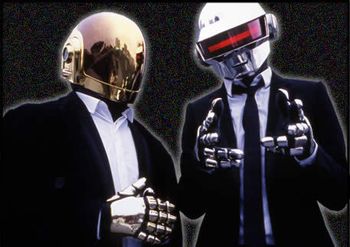

The strings and slide guitar on “Beyond,” “Within,” the piano ballad complete with tinkling fallout, and those shiny, sequined suits-this is an album made for courtship and seduction, not sex behind the speakers. But it can’t move people on an emotional level.” Maybe, he continued, the difference between Daft Punk’s new material and Avicii or Skrillex is the same as “between love and sex, or eroticism and pornography.” Many of the voices on Random Access Memories are laden with effects, and Daft Punk have admitted they couldn’t have made this record without computers, but this time they put that digital love into production value. Artists are overcompensating with this aggressive, energetic, hyperstimulating music - it’s like someone shaking you. In their recent cover story interview with Rolling Stone, Bangalter said, “Today, electronic music is like an audio energy drink. In retrospect, “One More Time” isn’t that different-in structure and life-affirming sentiment, at least-from something Will.i.am might have helped produce, while “Get Lucky,” with Pharrell and Nile Rodgers, is more classy, old school.ĭaft Punk went there for their new album partially in reaction to contemporary electronic music. Most notably, late DJ and producer Romanthony graduates from a cameo in Homework’s lockstep, roboticized list of “Teachers” to heavy-breathing lead vocals on “One More Time,” which was Daft Punk’s highest-charting song until “Get Lucky.” It’s no coincidence that both songs humanize the dancefloor, giving back life (and love) to the dead-eyed ravers jacking to the beat, trying to get some before the sun comes up. “Too Long” could have been put out by Salsa del Soul in the late ’70s, “Superheroes” samples crooner Barry Manilow, and “Something About Us,” with its waow-waow synths and adorably French-accented vocals is a straight-up panty-dropper. The theme even came up in last week’s remix of “Get Lucky”: Pharrell sings, “I’m up all night” and Daft Punk’s vocoded voices finish “to get lucky,” as if the robots want to get in on the action, too.Īfter 1997’s Homework, which drew heavily from Chicago house, Daft Punk took a baby step in the direction they would take over a decade later for Random Access Memories, and Discovery was decidedly warmer and more emotional than their debut. One need look no further than songs like “Digital Love,” Human After All’s “Emotion,” or the sad androids of the band’s art film Electroma, which self-destruct when their latex human masks melt in the sun. Since their sophomore album, Discovery, the human/robot dichotomy and its relationship with that lovin’ feeling have been a part of Daft Punk’s narrative. But Wilson retained his hold over Bangalter and Guy-Man, even after they donned masks and then helmets and became the Robots, which have historically had a tenuous relationship with human emotions.

They signed to Stereolab’s label, shared the stage with them a few times, were scorned as “daft punky thrash” by Melody Maker’s Dave Jennings, and disbanded. In 1992, Daft Punk’s once and future idol Brian Wilson said, “It was a childhood dream of mine to make music that made people feel loved.” That same year, Thomas Bangalter and Guy Manuel de Homem-Christo formed the indie-rock band Darlin’ (named after the Beach Boys song, natch) with Phoenix’s Laurent Brancowitz.


 0 kommentar(er)
0 kommentar(er)
